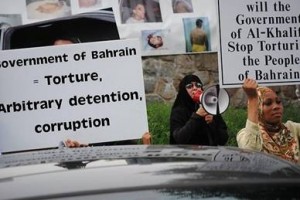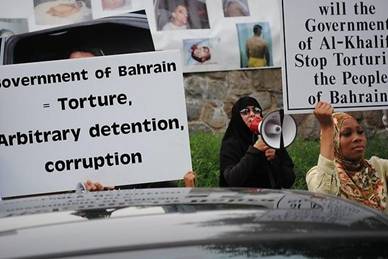 The undersigned human rights organizations are deeply concerned about the unfair sentences which are likely to be given to 50 Bahraini political and rights activists who have been on trial since July 11 in what is known as the case of the February 14 youth. The activists have been charged with forming an illegal coalition, which the authorities hold responsible for the violence seen in the country during the crackdown on the popular democratic uprising in February 2011. The court has already adjourned for sentencing, even though the trial did not meet minimum standards of fairness and impartiality. Seeing the process as a show trial for the issuance of predetermined sentences, the defendants and their lawyers decided to boycott the trial session scheduled for today, September 29.
The undersigned human rights organizations are deeply concerned about the unfair sentences which are likely to be given to 50 Bahraini political and rights activists who have been on trial since July 11 in what is known as the case of the February 14 youth. The activists have been charged with forming an illegal coalition, which the authorities hold responsible for the violence seen in the country during the crackdown on the popular democratic uprising in February 2011. The court has already adjourned for sentencing, even though the trial did not meet minimum standards of fairness and impartiality. Seeing the process as a show trial for the issuance of predetermined sentences, the defendants and their lawyers decided to boycott the trial session scheduled for today, September 29.
The composition of the judicial panel blatantly contravenes standards of judicial independence, as it is headed by the son of the speaker of the parliament and includes a member of the ruling family. The judges earlier disregarded the defendants’ claims that they were tortured, refusing to authenticate their testimonies or investigate their allegations. It is feared that the court will convict the defendants based on confessions obtained under torture. In addition, one of the prosecution witnesses who testified against them in court took part in the torture of the defendants.
According to reports seen by the undersigned organizations, the chief judge has previously presided over several exceptional trials in the quasi-military national safety courts, which have handed down harsh prison sentences to dozens of political and rights figures, including medics who were referred to trial after revealing that Bahraini authorities used health facilities as detention and torture centers during the crackdown on the February 2011 uprising. Abdulhadi al-Khawaja, the founder of the Bahrain Center for Human Rights (BCHR), and six other advocates of constitutional reform in the kingdom are serving life sentences issued by the National Safety Court after being convicted based on confessions extracted under torture.
Prominent human rights defenders in Bahrain remain targeted by various types of repression for exposing ongoing abuses in the country. A significant number of them have faced physical assaults or legal prosecution ending in prison sentences. Most prominent among them are Nabil Rajab, the president of the BCHR; Yousef al-Mahafdhah, the acting vice-president of the BCHR; and Mohammed al-Maskati, the president of the Bahrain Youth Society for Human Rights, as well as Naji Fatil, Zeinab al-Khawaja, and Hassan al-Jaber. Others, such as blogger Nader Abd al-Imam, blogger Mohammed Hassan, photographer Hussein Habil, and lawyer Abd al-Aziz Moussa, have also faced harassment by the security authorities. In addition, Maryam al-Khawaja, the acting president of the BCHR and co-director of the Gulf Center for Human Rights, was prevented in August 2013 from boarding a British Airways flight to Bahrain due to a communication issued by the Bahraini government effectively banning her from traveling to the country.
Rights activists who take part in activities of the United Nations continue to face smear campaigns that impugn their patriotism. At the same time, the authorities are seeking to impose further legal restrictions on the activities of human rights defenders and civil society organizations by amending the current NGO law.
The undersigned organizations warn of the consequences of increased political and sectarian tensions in light of repressive policies and practices that target political dissidents and human rights defenders, the use of severe security measures to suppress public assemblies, further legislation aimed at containing political opposition and advocacy work, and threats to revoke the citizenship of some rights activists on the pretext of their involvement in violence or terrorism.
The Bahraini authorities’ continued use of repressive security measures against political opponents and human rights defenders demonstrates the lack of political will to adopt the reforms necessary to fulfill the recommendations of the Bahrain Independent Commission of Inquiry, which examined the grave violations that accompanied the crackdown on the Bahraini uprising in February 2011.
Official acceptance of these recommendations has resulted only in perfunctory, formal measures aimed primarily at improving Bahrain’s image on the international stage while doing very little to address the abuses and to prevent impunity for their perpetrators.
The undersigned organizations stress that ending the current political crisis in the kingdom requires seriously adopting the Commission’s recommendations and the following urgent actions:
1. The immediate, unconditional release of political activists, prisoners of conscience, and human rights defenders.
2. The adoption of strict measures to ban torture and guarantee bodily integrity to detainees and prison inmates.
3. An end to the targeting of human rights defenders and political dissidents.
4. Accountability for those responsible for gross human rights abuses, particularly since the democratic uprising in February 2011.
5. Establishing the legal reforms necessary to demonstrate the authorities’ commitment to their international obligations on rights and civil liberties, an end to sectarian discrimination, and a reconsideration of judicial laws to guarantee the judiciary’s ability to function independently, free of interventions and pressures exerted by the executive authority and the ruling family.
Signatory Organizations
1. Cairo Institute for Human Rights Studies
2. Moroccan Instance for Human Rights
3. Human Rights First Society, Saudi Arabia
4. Tunisian League for the Defense of Human Rights
5. Bahrain Youth Society for Human Rights
6. Sudan Social Development Organization
7. Bahrain Center for Human Rights
8. Al Khatim Adlan Centre for Enlightenment & Human Development
9. Syrian Network for Human Rights
10. Bahrain Transparency Society
11. Sahrawi Association of Victims of Grave Human Rights Violations Committed by the Moroccan State
12. Arabic Network for Human Rights Information
13. Tunisian Center for Freedom of the Press
Share this Post

